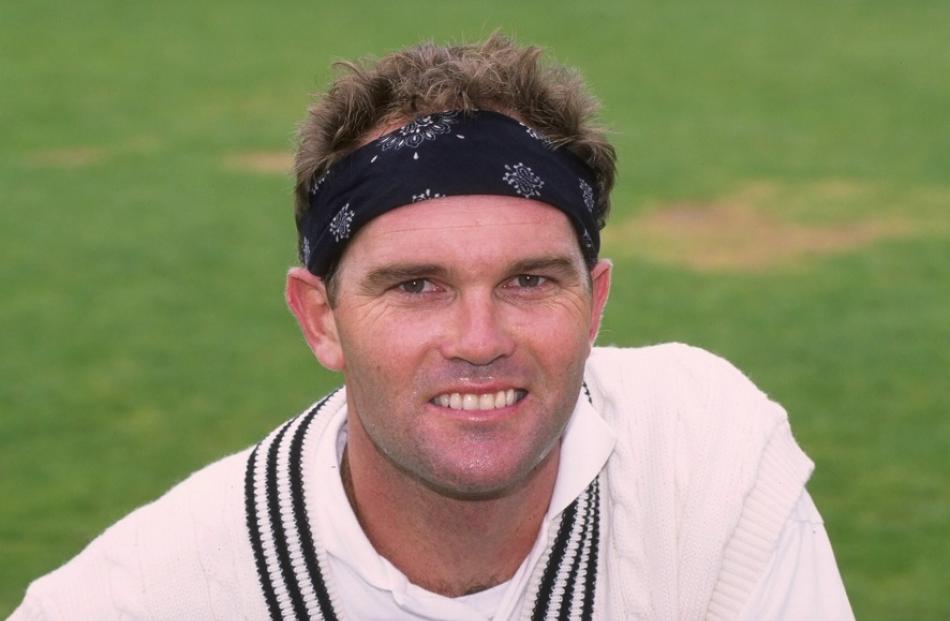New Zealand cricketing great Martin Crowe has died.
Crowe died today after a prolonged battle with cancer that eventually proved one attack the gifted cricketer couldn't see off.
A statement released by his family, and headed "God Speed, Rest in Peace", said: "It is with heavy hearts that the family of Martin Crowe, MBE advise his death."
"Diagnosed in September 2014 with terminal double hit lymphoma he passed away peacefully today, Thursday 3rd March in Auckland surrounded by family. The family request privacy at this time."
Crowe is survived by wife Lorraine Downes, daughter Emma and step-children Hilton and Jasmine. He was 53.
One of the finest athletes this country has ever produced, Crowe made a considerable mark both on and off the pitch during a life spent in sport.
In 14 years spent wearing the silver fern Crowe, blessed with a wide array of strokes, dispatched the world's best bowling attacks to all corners.
In 1991 he was named New Zealand sportsman of the year and awarded an MBE for services to cricket. Crowe was inducted into the New Zealand sports hall of fame a decade later, having continued a love affair with cricket that extended long beyond his premature retirement.
Crowe captained his country from 1990-1993, mixing his prodigious style at the crease with a number of innovations, including opening the bowling with spinners, implementing unexpected field placements and utilising pinch-hitting batsmen.
Born on September 22, 1962, in Henderson, Auckland, Crowe was the son of former domestic cricketer Dave. His brother Jeff also went on to captain the New Zealand cricket side. The siblings were cousins of Hollywood actor Russell.
Our thoughts are with the family of Martin Crowe. RIP a true NZ sporting great. pic.twitter.com/Yr7GoyHv5K
— All Blacks (@AllBlacks) March 3, 2016
A stylish batsman, Crowe made his test debut in 1982 at the tender age of 19, batting at No 6 against Australia and experiencing the rare distinction of being run out in his maiden innings.
He struggled early in his career - later saying his international call-up came "way too soon" - and he failed to reach double figures in his first six innings. But his immense talent soon became clear, scoring the first of his 17 test centuries in his eighth test against England.
Crowe's career highlight with the bat will, unfortunately, forever be married to his most regrettable playing stroke, edging behind off Arjuna Ranatunga to be dismissed for 299 at the Basin Reserve.
At the time, in 1991, no New Zealand batsman had reached triple figures, a drought that extended until Brendon McCullum's innings of 302 came 23 years after Crowe's failure and, fittingly, at the same venue.
A year later, Crowe came within one match of captaining New Zealand to their first Cricket World Cup final, thrilling home fans at an event held on both sides of the Tasman. Crowe was the standout performer at cricket's premier tournament, being named the best player after scoring one century and four fifties to lead his nation to the semifinals.
Crowe played his 77th and final test in 1995, falling for 15 in the first innings of a draw against India, and, a fortnight later, in his last one-day international, he scored 63 to help his side beat the same opposition.
His career was curtailed only by a chronic knee injury and, just 33 at the time, his influence at the crease could have continued for a number of years were it not for his body.
As it was, Crowe finished his test career with 5444 runs - at the time a New Zealand record - and an average of 45.36, bettered only by Kane Williamson (cuurently 49.93), John Reid (46.28) and protege Ross Taylor (currently 45.49). Crowe's 17 centuries remain the most by a New Zealander, four more than Williamson and Taylor.
After such a distinguished playing career, Crowe continued to have a role in cricket, either behind the microphone in the commentary box, as a mentor and batting coach to contemporary Black Caps, or continuing an innovative streak by creating the Cricket Max format, a precursor to Twenty20.
Crowe married Downes, a former Miss Universe, in 2009 following a 25-year friendship. He had previously been married to interior designer Simone Curtice, from whom he separated in 1996, while he also had a daughter with Suzanne Taylor.
But Crowe's relationship with the game he loved was a constant and, in 2011, at the age of 49, he shocked the cricket community by declaring his intention to return to the first class scene, 16 years after retiring. Crowe turned out for former club Cornwall and aimed to once again play for Auckland but, after sustaining four muscle injuries in as many months, he admitted his body was unable to withstand the rigours of the sport.
The mere fact Crowe seriously contemplated a return to the middle was a measure of the man's talent, with his hand-eye coordination and shot-making ability belied only by an ailing body.
Sadly for Crowe, those health issues soon extended outside of the lines, announcing in 2012 he had been diagnosed with lymphoma, blaming the illness on an immune system ravaged by the various maladies he endured while touring the world during his cricket career.
A year later Crowe confirmed he was clear of cancer's grip but in September 2014 said on Twitter he had suffered a lymphoma relapse, with his condition seriously worsening in the last few months.
"When he had completed chemotherapy he looked a shadow of the young man I once knew," said Sir John Graham, Crowe's headmaster at Auckland Grammar and a former All Black captain.
"Yet he spoke with a growing and renewed confidence of his desire to help others. He spoke of the importance, particularly to young New Zealanders, of following one's dreams, of facing challenges, of aiming high."
In February last year, Crowe was inducted into the ICC Hall of Fame, receiving the honour at the Cricket World Cup pool match between the Black Caps and Australia. He received a standing ovation in front of a full house at Eden Park, a ground he made his own during the Cricket World Cup of 1992. Crowe became the third New Zealander to gain a place in the Hall, alongside Sir Richard Hadlee and Debbie Hockley.
One of his last public appearances was at the New Zealand Cricket awards last April when he gave a heartfelt speech congratulating the retiring Daniel Vettori on his career.
Before the Cricket World Cup final Crowe penned an emotional column for espncricinfo.com, writing: "My precarious life ahead may not afford me the luxury of many more games to watch. So this is likely to be it. I can happily live with that."













